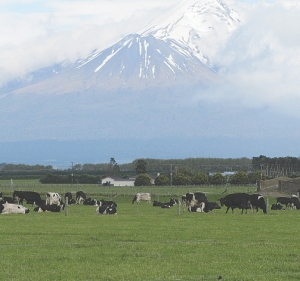The company’s New Zealand marketing manager, Fenton Hazelwood, says agriculture must balance productivity with the environment and consumer demand. But sustainability has become “a politically correct throwaway word” and stakeholders have differing views on what it is and how it can be achieved, he says.
Earlier this year, BASF organised the Perspectives for Agriculture - Sustainability Symposium in Berlin, which Hazelwood attended. It brought together environmental lobby groups, leading experts from the food industry, farmer organisations, academia, regulators and agribusinesses. In taking this initiative, BASF laid the foundation to bring forward solutions for sustainability assessment, an essential part of the agricultural business.
Hazelwood questions “the true meaning” of sustainability: is it just having a clean and green image? Is it just a marketing tool for agribusinesses?
In New Zealand, the dairy sector is facing questions over its sustainable farming methods. The industry recently released the ‘Sustainable Dairying: Water Accord’. With Fonterra aiming to have all waterways and streams fenced off on its supplier farms by December this year.
Hazelwood acknowledges that the dairy industry is making great gains on sustainability. But he questions whether fencing off productive strips near waterways is just an attempt to satisfy public opinion and send a positive message to the market.
“While this is a positive step, is it truly the way forward for farming ensuring our land is available for the next generation? Or are we doing just enough to tick the boxes?”
The financial cost to the farmer to meet sustainable farming goals set out by consumers and regulators also play a key role, he says.
He points to potato chips maker Bluebird, which sets a high standard for suppliers. However, only some family farms and corporate farmers, who have the money, can meet those standards.
“For most farmers the returns are not enough to effectively deal with sustainability,” he says. Unlike EU farmers, who get subsidies to farm in a sustainable way, New Zealand farmers have to fork out money to set aside land for wildlife and grow trees. “In New Zealand, we don’t have those subsidies, so how do we compete in the sustainability race in the long term?”
As part of its sustainable agriculture programme, BASF has launched AgBalance, a scheme that evaluates the holistic sustainability performance of agricultural products or processes in respect of the economy, environment and society. To date, BASF has conducted 15 studies from Brazil to China, measuring and identifying more sustainable processes and techniques in agricultural production.
BASF’s guiding principle is ‘You can only manage what you have measured’. “For the prosperity of agriculture in New Zealand, it is fundamental to manage and show progress in its sustainable development” says Hazelwood.
One of the major outcomes of the Perspectives for Agriculture Symposium was that sustainability assessment needs common principles in both the agricultural and the food supply sectors, so that the assessment tools the producers and their partners use speak the same language globally.
Hazelwood says there will be challenges.
“There is still is a big challenge in front of us, in the journey of sustainability of the food supply chain. Every link in that chain has to understand their role and comply with it. While this is a journey that every country in the world is on at some level, New Zealand is not showing the leadership appropriate to its 100% Pure international branding.

















